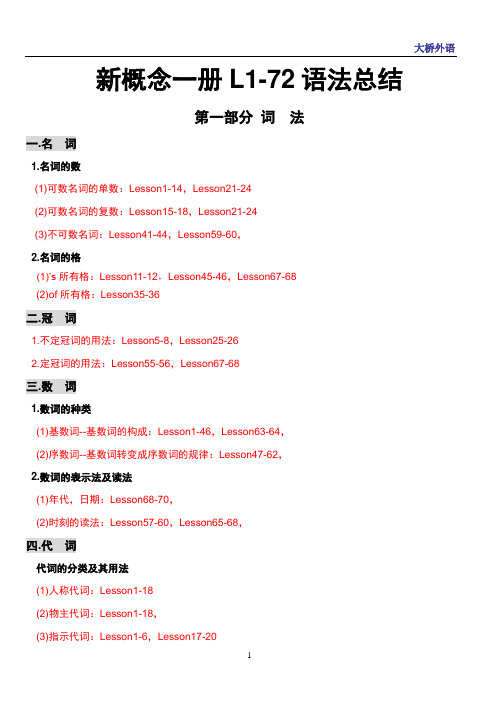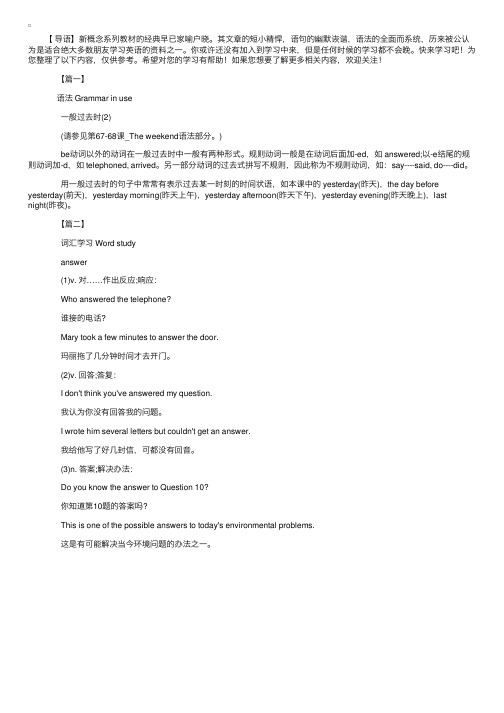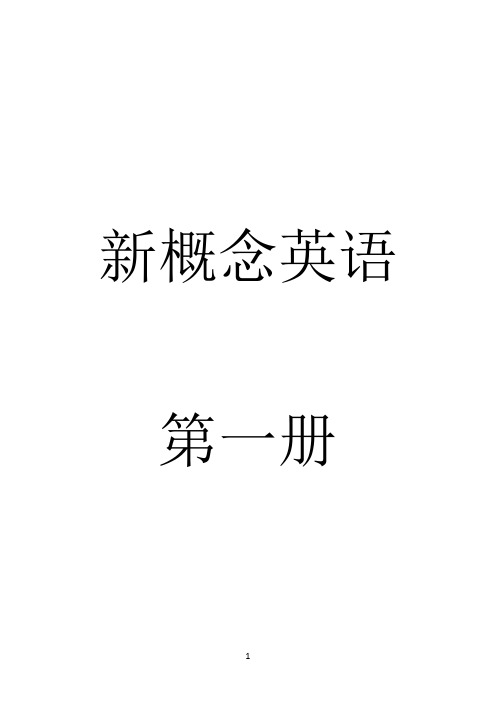2020最新新概念英语第一册Lesson67~72语法及单词
新概念第一册Lesson67-70知识要点总结

新概念第一册68,69,70复习要点一.词汇拓展:1.greengrocerat the greengrocer’s 在蔬菜水果店go to the greengrocer’s 去蔬菜水果店2.absentNobody is absent today.今天没有人缺席。
3.Keep healthy 保持健康Keep clean 保持干净Keep happy保持开心4.How are you all keeping?你们身体都好吗?5.spendspend two hours 度过两个小时spend the summer holiday 度过暑假spend two years 度过两年6.luckya lucky dog 幸运儿Good luck to you!祝你好运!7.churchat the church在教堂at church在教堂做礼拜8.dairyat the dairy在乳品店9.bakerat the baker’s 在面包店10.g rocerat the grocer’s 在杂货店11.y ear/week/monthlast year 去年this year 今年next year明年two years ago 两年前12.r ace和rice发音不同,注意区分a running race 一个赛跑比赛a car race 一个赛车比赛13.c rowdin the crowd 在人群中a crowd of students一群学生14.e xcitingThe car race is exciting.赛车比赛激动人心。
We are all excited.我们都很激动。
15.f inishAt the finish of the race,he hurt himself.在比赛结尾的时候,他受伤了。
16.w innerswimmer/runner17.w ayOn his way home,he saw a pretty bird.在回家的路上,他看到一只好看的鸟。
新概念英语第一册第67课

目录 Contents
• Overview of Text Content • Vocabulary and expression • grammar point • text analysis • Practice and activities
。例如:“I like apples,
but
my
friend
doesn’t.”
复合句
包含一个主句和一个或多 个从句的句子。例如:“I like apples, which are healthy for me.”
Tenses and Voices
时态
描述动作发生的时间,如现在、 过去或未来。例如:现在进行时 “I am eating an apple.”
语态
描述动作与主语的关系,如主动 或被动。例如:被动语态“The apple is being eaten by me.”
Grammar application
名词
用来表示人、事物或抽象 概念的词。例如: “apple”、“person” 、“happiness”。
动词
描述动作或状态的词。例 如:“run”、“eat”、 “be”。
VS
Activity 2
Have a small group discussion about a topic related to the lesson. Each person should contribute their ideas and listen to others, practicing active listening and turn-taking.
新概念一册L1-72语法总结

新概念一册L1-72语法总结第一部分词法一.名词1.名词的数(1)可数名词的单数:Lesson1-14,Lesson21-24(2)可数名词的复数:Lesson15-18,Lesson21-24(3)不可数名词:Lesson41-44,Lesson59-60,2.名词的格(1)’s所有格:Lesson11-12,Lesson45-46,Lesson67-68(2)of所有格:Lesson35-36二.冠词1.不定冠词的用法:Lesson5-8,Lesson25-262.定冠词的用法:Lesson55-56,Lesson67-68三.数词1.数词的种类(1)基数词--基数词的构成:Lesson1-46,Lesson63-64,(2)序数词--基数词转变成序数词的规律:Lesson47-62,2.数词的表示法及读法(1)年代,日期:Lesson68-70,(2)时刻的读法:Lesson57-60,Lesson65-68,四.代词代词的分类及其用法(1)人称代词:Lesson1-18(2)物主代词:Lesson1-18,(3)指示代词:Lesson1-6,Lesson17-20(4)反身代词:Lesson65-66(5)不定代词:Lesson21-24,Lesson41-42,Lesson59-60,Lesson63-64,(6)疑问代词:Lesson1-144五.形容词形容词的原级:Lesson9-10,Lesson21-24,Lesson25-28,六.副词频度副词:Lesson55-58七.介词1.方位介词:Lesson31-36, Lesson51-542.时间介词:Lesson51-56, Lesson65-70,3.常见介词的用法:Lesson31-36八.连词九.感叹词十.动词1.系动词:Lesson1-8,Lesson11-12,Lesson15-162.情态动词:can:Lesson43-46, Lesson61-66,must:Lesson61-66,3.实意动词:Lesson47-57,第二部分句法一.简单句1.陈述句:(1)肯定句:Lesson1(2)否定句:Lesson12.疑问句:(1)一般疑问句:Lesson1-144;(2)特殊疑问句:Lesson3-144(3)选择疑问句:Lesson49-503.祈使句:Lesson13-14, Lesson21-24, Lesson29-30, Lesson39-40, Lesson61-644.There be句型:Lesson19-20,Lesson25-28,Lesson41-44,Lesson59-60,Lesson69-70,5.have用法:Lesson59-62,第三部分时态一.一般现在时:Lesson1-18, Lesson47-58, Lesson65-68,二.现在进行时:Lesson31-38, Lesson67-68,三.一般将来时:Lesson37-40, Lesson65-68,四.一般过去时:Lesson67-76。
新概念英语第一册:71-72课语法及单词解析

【导语】新概念系列教材的经典早已家喻户晓。
其⽂章的短⼩精悍,语句的幽默诙谐,语法的全⾯⽽系统,历来被公认为是适合绝⼤多数朋友学习英语的资料之⼀。
你或许还没有加⼊到学习中来,但是任何时候的学习都不会晚。
快来学习吧!为您整理了以下内容,仅供参考。
希望对您的学习有帮助!如果您想要了解更多相关内容,欢迎关注!【篇⼀】语法 Grammar in use ⼀般过去时(2) (请参见第67-68课_The weekend语法部分。
) be动词以外的动词在⼀般过去时中⼀般有两种形式。
规则动词⼀般是在动词后⾯加-ed,如 answered;以-e结尾的规则动词加-d,如 telephoned, arrived。
另⼀部分动词的过去式拼写不规则,因此称为不规则动词,如:say----said, do----did。
⽤⼀般过去时的句⼦中常常有表⽰过去某⼀时刻的时间状语,如本课中的 yesterday(昨天),the day before yesterday(前天),yesterday morning(昨天上午),yesterday afternoon(昨天下午),yesterday evening(昨天晚上),lastnight(昨夜)。
【篇⼆】 词汇学习 Word study answer (1)v. 对……作出反应;响应: Who answered the telephone? 谁接的电话? Mary took a few minutes to answer the door. 玛丽拖了⼏分钟时间才去开门。
(2)v. 回答;答复: I don't think you've answered my question. 我认为你没有回答我的问题。
I wrote him several letters but couldn't get an answer. 我给他写了好⼏封信,可都没有回⾳。
新概念英语第一册67-70课课文详解、翻译及语法

Lesson 67The weekend周末Listen to the tape then answer this question. What are the Johnsons going to do at the weekend? 听录音,然后回答问题。
约翰逊夫妇周末准备做什么?MRS.JOHNSON: Hello.Where you at the butcher's?MRS.WILLIAMS:Yes. I was.Were you at butcher's, too?MRS.JOHNSON: No, I wasn't.I was at the greengrocer's.How's Jimmy today?MRS.WILLIAMS:He's very well, thank you.MRS.JOHNSON: Was he absent from schoollast week?MRS.WILLIAMS:Yes, he was.He was absent on Monday,Tuesday,Wednesday and Tuesday.How are you all keeping?MRS.JOHNSON: Very well, thank you.We're going to spendthree days in the country.We're going to stay at mymother's for the weekend.MRS.WILLIAMS:Friday, Saturday and Sundayin the country!Aren't you lucky!New Word and expressions 生词和短语greengrocern. 蔬菜水果零售商absentadj. 缺席的Mondayn. 星期一Tuesdayn. 星期二Wednesdayn. 星期三Thursdayn. 星期四keepv. (身体健康)处于(状况)spendv. 度过weekendn. 周末Fridayn. 星期五Saturdayn. 星期六Sundayn. 星期日countryn. 乡村luckyadj. 幸运的参考译文约翰逊夫人:您好。
新概念英语第一册1-72课语法点总结

新概念英语第一册新概念英语第一册1-72课语法点总结1.物主代词词。
2.人称代词3.Be动词Be动词在一般现在时的三个变形:am, is, areBe动词在一般过去时的两个变形:was, were●注意:Be动词要根据主语的变化而变化。
4.一般疑问句定义:一般疑问句是指可以用Yes或者No回答的句子。
肯定句变为一般疑问句:若一个肯定句中存在Be动词am, is, are,则直接将Be动词提前,结尾加问号。
若一个肯定句中存在情态动词,则直接将情态动词提前,结尾加问号。
若一个肯定句中存在实义动词,则直接在句首加助动词do/does/did,实义动词变原形,结尾加问号。
注意:一般疑问句一般读为升调。
例:Are you a teacher? 你是一名老师吗?肯定回答:Yes, I am. 否定回答:No, I am not.Do you like English? 你喜欢英语吗?肯定回答:Yes, I do. 否定回答:No, I don’t.5.特殊疑问句定义:不能用Yes或者No回答的句子。
构成:特殊疑问词+ 一般疑问句特殊疑问词:what(什么), when(何时), where(何地), who (谁), whom(谁宾格), whose(谁的), which(哪个), why (为什么), how(怎么样)口诀:非常八加一6.不定冠词a/an若单词是以“a, e, i, o”四个元音开头,其前面选用“an”;若单词是以元音字母“u”开头,视情况而定。
若其发音与“umbrella”中的“u”一致,则前面加“an”;若其发音与“university”中的“u”一致(即发字母本身音时),前面加“a”。
若单词是以辅音字母开头,一般前面用a。
特殊:an hour 一个小时;an honest boy 一个诚实的男孩若一个字母单独出现时,分如下情况:加an的字母:a, e, i, o(元音);x, r, s, l, n, f, m, h (辅音;口诀为“学而思送来那份美好”)例:There is an “m” in the word “umbrella”. 在单词umbrella里面有一个字母m。
新概念英语第1册第67-68课重点语法

第67-68课的内容: ⼀、重要句型或语法 1、⼀般过去时 表⽰过去发⽣的⽽现在已经结束的动作或状态。
本课主要学习的是系动词be的过去式,即was/were的⽤法。
如:I was at the geengrocer's. / Were you at the butcher's? 2、the+店主名称+'s the+店主名称+'s,⽤来表⽰商店,如:the greengrocer's,果蔬店;the butcher's,⾁店。
⼆、课⽂主要语⾔点 Were you at the butcher's? Yes, I was. 可对was/were的肯定句、否定句和⼀般疑问句进⾏操练。
学⽣程度好的话,可进⾏划线部分提问,即操练特殊疑问句。
How's Jimmy today? He's very well, thank you. How's sb.?,⽤来询问某⼈的⾝体状况或近况。
well作为形容词,主要⽤来表⽰⼈的⾝体不错。
Was he absent from school last week? 1)be absent from,表⽰缺席、缺勤。
可介绍absent的名词absence。
2)last week,表⽰上周。
last⽤来表⽰过去的时间,是⼀般过去时的标志性时间状语。
考虑到在71-72课以及第75-76课⾥会专门学习过去时间的表达,在此不宜做过多过去时间的知识拓展。
He was absent on Monday, Tuesday, Wednesday and Thursday. 介词on后接具体⽇期或星期,即具体哪⼀天⽤on。
How are you all keeping? 相当于How are you?,⽤来询问对⽅⾝体状况。
We're going to spend three days in the country. 1)此处的can表⽰许可。
新概念第一册L67-L70整理稿

1. Where is there a car race every year?
There’s one near our town every year.
2. When was there a very big car race?
In 1995.
3. How many people were there?
Language points
★ hundreds of
数以百计的
thousands of
millions of 500 6,000 7,000,000 8,000,000,000
数以千计的
数以万计的 5 hundred 6 thousand 7 million 8 billion
★ at the race ★ on the way to…
1. Where is there a car race every year? 2. When was there a very big car race? 3. How many people were there? 4. Were our friends, Julie and Jack, at the race? 5. How many cars were there in the race? 6. What cars were there in the race?
sb. + spend(s) $ on sth. some time (in) doing sth. sb. + pay(s) $ for sth.
sth. + cost(s) sb. $
It + takes sb some time to do sth.
一般过去时
- 1、下载文档前请自行甄别文档内容的完整性,平台不提供额外的编辑、内容补充、找答案等附加服务。
- 2、"仅部分预览"的文档,不可在线预览部分如存在完整性等问题,可反馈申请退款(可完整预览的文档不适用该条件!)。
- 3、如文档侵犯您的权益,请联系客服反馈,我们会尽快为您处理(人工客服工作时间:9:00-18:30)。
新概念英语第一册Lesson67~68语法及单词
语法Grammar in use
一般过去时
be( am/is/are)的过去式是was/were:
在英文中,过去发生的而现在已经结束的动作要用一般过去时来表示。
be 动词的过去式不规则,第1人称与第3人称单数用was,其他情况用were。
用be动词的一般现在时形式的一般疑问句及特殊疑问句迄今已介绍过,其过去时形式也一样,只是动词be在形式上变为was或were。
请看以下例句:
Was Mrs.Johnson at the butcher’s?
约翰逊夫人在肉店吗?
No,sha wasn’t.
她不在。
Were you at school or at church ou January 1st ?
1月1号你在学校还是上教堂了?
I wasn't at school on January 1 st .I was at church.
我1月1号没上学。
我上教堂做礼拜了。
When was he absent from school ?
他何时缺课了?
He was absent on Monday,Tuesday,Wednesday and Thursday .
他周一、周二、周三和周四缺课了。
Where were you on Sunday ?
周日你在哪儿?
I was at church on Sunday.
我周日在教堂做礼拜。
词汇学习Word study
1. spend v.
(1)花(时间等);度过:
Where are the Johnsons going to spend the weekend ?
约翰逊一家准备到哪儿去度这个周末?
I hope that you wouldn’t spend so much time watching television.
我希望你不要花这么多的时间看电视。
(2)用(钱),花费:
I’m going to spend all my money this weekend !
这个周末我要把我所有的钱都花掉!
At present,more and more people have come to realize that more money should he spent on health and education.
目前,越来越多的人已开始认识到:应该在健康和教育方面多花些钱。
2 .country
(1) n.国家;国土;故乡:
China is a country with a large population.
中国是一个人口众多的国家。
India,a former British colony,is now a fully independent country.
曾一度为英国殖民地的印度如今已是一个完全独立的国家。
(2) n .〔the一J乡下,乡村:
His mother has always wanted to live in the country.
他的母亲一直以来都想居住在乡间。
How many days are they going to spend in the country ?
他们准备在乡下过几天?
(3) adj. 乡下的;乡村风味的:
I prefer country life to life in the city.
乡村生活与城市生活相比,我更喜欢乡村生活。
after nearly thirty years in the city,he’s still country。
他在城里住了将近三十年,可还是土气十足。
新概念英语第一册Lesson69~70语法及单词
语法Grammar in use
用介词at , on和in的时间短语
(1 )用介词at的时间短语通常可表示:确切的时间(如at 10 o' clock 10点钟时),用餐时间(如at lunchtime 午餐时),其他时刻(如at noon 中午时),节日(如at Christmas 圣诞节时),年龄(如at the age of 27 二十七岁时)等。
介词at可表示地点,通常用于某个小地点之前:
at the bus-stop 在公共汽车站
at the railway station 在火车站
at the butcher's 在肉店
at school 在学校
at the office 在办公室
at home 在家
(2)介词on用于周和月份中的任何一天之前。
请参见第65-66课_Not a baby 语法部分。
(3)用介词in的时间短语通常可表示: 一天中的某段时间(如 in the evening在晚上),月份(如 in March在3月),年份(如 in 1997 在1997年),
季节(如in Spring在春天),世纪(如in the 20th century在20世纪),节日(如in Easter week在复活节那一周),时期(如in the holidays在假期里)等。
词汇学习Word study
1 stand v.
(1)站立,起立:
We were standing on the right.
我们当时站在右边。
They stood because there were no seats.
没有座位,所以他们只好站着。
(2)(建筑物)直立,耸立;(植物)直立生长:
The white house stands on a hill.
那幢白色的房子耸立在小山上。
Look at the corn standing in the fields!
瞧那长在地里的玉米!
2 Finish n.
(1)结束;最后阶段(或部分):
The finish of the race was very exciting.
比赛的最后一个阶段十分激动人心。
At eleven the dinner finally dragged to a finish.
宴会拖到11点才结束。
(2)完美,完善;(举止等)优雅:
His dancing lacks finish.
他的舞跳得并不完美。
We hoped that four years of college would give him some finish.
我们希望4年的大学教育会使他有些教养。
新概念英语第一册Lesson71~72语法及单词
语法 Grammar in use
一般过去时
(请参见第67-68课_The weekend语法部分。
)
be动词以外的动词在一般过去时中一般有两种形式。
规则动词一般是在动词后面加-ed,如 answered;以-e结尾的规则动词加-d,如 telephoned, arrived。
另一部分动词的过去式拼写不规则,因此称为不规则动词,如:
say----said, do----did。
用一般过去时的句子中常常有表示过去某一时刻的时间状语,如本课中的yesterday(昨天),the day before yesterday(前天),yesterday morning(昨天上午),yesterday afternoon(昨天下午),yesterday evening(昨天晚上),last night(昨夜)。
词汇学习 Word study
answer
(1)v. 对……作出反应;响应:
Who answered the telephone?
谁接的电话?
Mary took a few minutes to answer the door.
玛丽拖了几分钟时间才去开门。
(2)v. 回答;答复:
I don't think you've answered my question.
我认为你没有回答我的问题。
I wrote him several letters but couldn't get an answer.
我给他写了好几封信,可都没有回音。
(3)n. 答案;解决办法:
Do you know the answer to Question 10?
你知道第10题的答案吗?
This is one of the possible answers to today's environmental problems. 这是有可能解决当今环境问题的办法之一。
